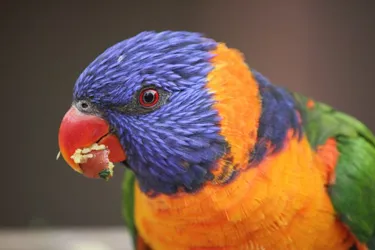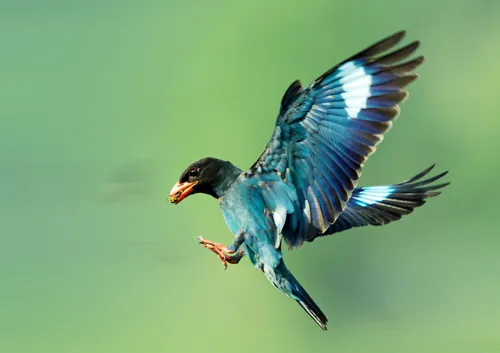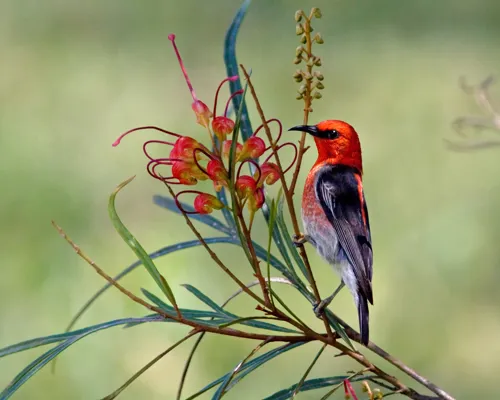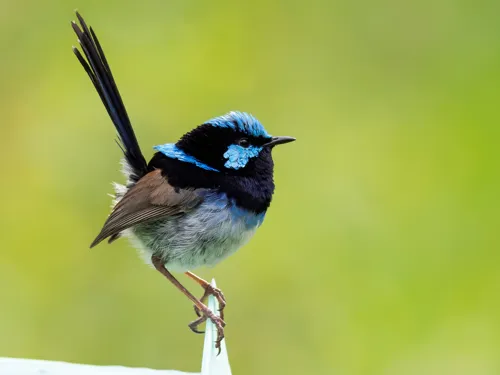Top Tips For Bird Watching On Your Daily Walk
- Wednesday 6th October 2021
- Birds, Bird Watching

Get more from your daily walks with expert nature tips.
From admiring birds on daily walks to making feathered balcony friends who have likely replaced co-workers, bird watching is the wholesome activity that’s taken flight across states thanks to the pandemic.
To make the most of your spring walks, WILD LIFE Sydney Zoo Keeper and bird-lover, Shania Kelly, shares her top tips for bird watching and wild bird care.
From Bowerbirds to Plumed Whistling Ducks, Shania looks after over 13 species of birds who call WILD LIFE Sydney Zoo’s open aviary home and has a wealth of advice on how to make feathered friends.
“While people are still working from home, it’s the perfect time to enjoy the wonderful birdlife visiting your balconies and backyards. To get the most from your regular walks, I encourage people to take note of the bird courting behaviours on display, and listen out for mating songs taking place during spring, using some of these handy tips”, added Keeper Shania.
Bird Watching Tips
- You're more likely to hear the birds before you see them so on your walks wear quiet, non-rustling clothing and pause your music to listen for different bird species’ calls.
- To encourage birds to visit your backyard, plant native plants to create a vibrant ecosystem suitable for birds. Non-native plants can be toxic to birds, so planting them could harm birds or deter them from visiting you. Grevilleas, Banksia and Kangaroo Paw are great for seducing birds into your garden!
- Keep a pair of binoculars by your balcony or take them with you on your walk for a closer inspection from a distance that’s less likely to spook birds.
- Not only do early birds get the worm, but they also get to enjoy more birds! By birdwatching early in the morning, you increase your chance of discovering more birds, as birds tend to be more active early in the morning.
- Keep an eye out for the saucy mating patterns of the Superb Fairy-wren: one female Superb Fairy-wren may be courted by up to 13 males in the space of half an hour, and three-quarters of a female’s offspring will be fathered by males outside her social group. Listen out for their high-pitched trills and keep your eyes peeled as they dart in and out of low bushes in parks, gardens, and forests.
Bird-Friendly Feeding
- Did you know that feeding seeds to Rainbow Lorikeets is dangerous for them? Instead, you can easily purchase Lorikeet feed mix from your local grocery or pet store. Lorikeets are obsessed with Lorikeet mix and feeding them the mix will instantly make you their new best friend!
- Avoid feeding birds processed meats and bread. Processed meats lack minerals like calcium and can leave birds such as magpies nutritionally deficient. This can lead to disease and growing problems for younger birds. Instead, try mealworms or crickets. For ducks, you can easily swap bread for frozen peas from your freezer as a healthy and duck-friendly treat.
- Although an easy option, Sunflower seeds are very high in fat and not a great option for birds (think of them like candy or junk food for birds). For a healthier alternative I suggest providing small, cut-up fruit such as grapes, strawberries, blueberries, and apples as a non-harmful alternative.
- In hot weather, leave a shallow non-metal bowl of clean water on your balcony to encourage birds to visit for a cool drink or bath. The bowl must be cleaned and refilled daily to prevent bacteria from growing. Avoid metal bowls as they heat up in the sun. Make sure the bowl is in a pet safe environment e.g. out of the reach of your pet cat! Even better place a large rock or stick inside in case a smaller bird or animal goes in and can’t get back out! (works like a pool ladder for safe exit)
Keep an eye out for these beautiful birds on your next walk
Dollarbird
Found in Queensland, New South Wales, Victoria, and Northern Territory

Known for the white spots on their wings which resemble silver coins, the Dollarbird arrives in northern and eastern Australia every September to breed. During the breeding season, pairs of Dollarbirds are often seen flying in characteristic rolling flights. Spring is the perfect time to keep your eyes peeled as they launch from perches in pursuit of flying insects or tussle through the air with their mate.
Scarlet Honeyeater
Found in Victoria and rare sightings in New South Wales

With vivid scarlet red and black underparts, the adult male Scarlet Honeyeater doesn’t easily blend into its surroundings like other bird species. Although this species lives in open forests and woodlands with a sparse understorey, it can also be seen in urban areas in flowering plants of streets, parks and gardens. Female Scarlet Honeyeaters are a dull brown with dull white underparts with only a reddish wash on the chin. The Scarlet Honeyeater breeds in pairs, with the more conspicuous male calling and displaying to the quieter females
Superb Super-Wren
Found in Queensland, New South Wales, South Australia, and Tasmania

The male Superb Fairy-wren is among one of the brightest coloured species during breeding season with their bright blue and black plumage. This stunning species can be found south of the Tropic of Capricorn through eastern Australia and Tasmania to the south-eastern corner of South Australia. When out walking keep a lookout for their nest as the dome-shaped structures of grasses and other fine material is usually placed in a low bush constructed by the female.
Visit us to learn more about the birds including Southern Cassowaries, Plumed Whistling Duck, Bush Stone Curlew and Bowerbirds that call WILD LIFE Sydney Zoo home.
WILD LIFE Sydney Zoo is home to over 13 species of bird including: Budgies, Cockatiels, King parrots, Lorikeets, Brown cuckoo doves, Spinifex Pigeons, White-headed Pigeons, Emerald doves, Wonga pigeons, Topknot pigeons, Rose crown fruit doves, Silvereye finch, Zebra finch, Bush stone Curlew, Bower birds, Plumed whistling duck and a Southern Cassowary.
Online From
$49
Per Adult
-
Peak pricing applies to school holidays and weekends.
Ticket Type Weekdays Weekends, School Holidays & Public Holidays On the day Advanced Adult $49.00 $39.00 $49.00 Child $36.00 $26.00 $36.00 Concession $39.00 $29.00 $39.00 Child (0-1 yrs) FREE Please note: Our ticket pricing is subject to available capacity and prices may fluctuate during periods of high demand.
Peak pricing includes school holidays in other Australian states.
- Price includes Digi Photo Pass with 8 digital photos included (excludes Koala Photo experience)!
- Children under 16 years of age must be accompanied by an adult (18+)
- Get your ticket on your phone
Online From
$0
Per Adult
- Book this ticket if you have a multi attraction pass or gift voucher and need to select a date and time
- Make sure you book a date and time to guarantee entry
- Limited capacity